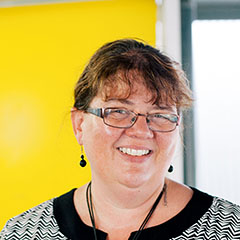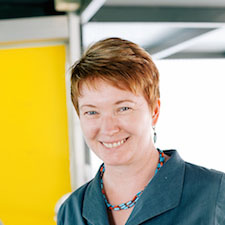
Gwen Lawrie
Two senior University of Queensland Faculty of Science academics committed to delivering world class teaching have been recognised as Senior Fellows of the Higher Education Academy, UK.
Associate Professor Gwen Lawrie (School of Chemistry and Molecular Biosciences) and Professor Michael Drinkwater (School of Mathematics and Physics) join Associate Professor Susan Rowland (School of Chemistry and Molecular Biosciences and Institute for Teaching and Learning Innovation - ITaLI) as Academy Senior Fellows.
UQ Executive Dean of Science Professor Melissa Brown congratulated the new senior fellows on their achievements.
Associate Professor Rowland, who is the ITaLI Deputy Director, said accreditation through the Higher Education Authority (HEA) provided university staff with an internationally-acknowledged recognition of their skills and practice.
“It provides a way for universities to evidence the quality of the education its students will get,” she said.

Drinkwater
“It also provides professional recognition for academics who want to evidence the quality of their teaching work.
“In 2016 ITaLI launched a pilot program to assist UQ staff gain HEA Accreditation at levels from Associate Fellow through to Principal Fellow.”
She said the pilot program, where Faculty-based academics worked with ITaLI academics to evidence the quality and professionalism of their teaching practice, had more than delivered on its goals.
“The pilot program staff, all of whom have successfully completed their accreditation, now join over 88,000 individuals from around the world who are recognised as Fellows of the HEA.”
“The Academy offers Fellowships at various levels and I look forward to helping other educators engage with the process,” she said.

Susan Rowland
Associate Professor Lawrie as the Director of First Year Chemistry has guided a large team of academics and professional staff in the development and delivery of a new first year curriculum through engagement of academics across multiple faculties and disciplines at UQ.
The First Year Chemistry team has been recognised through a 2016 UQ Award for Programs that Enhance Learning.
Gwen implements high impact and inclusive learning and teaching practices in her large first year courses and these include embedded strategies and mechanisms for providing students with rich formative feedback encouraging them to grow as independent learners.
“My goal is to create learning environments in which all students are valued and respected as individual learners,” she said.
“I believe that reflective practice, both as a teacher and as a learner, is critical and develops awareness and enhanced thinking skills. The core question that underpins my practice has become ‘How do I know that my students are learning?’”
Professor Drinkwater was appointed to UQ in 2002 to build a new astrophysics program and has designed new course content and introduced new teaching approaches.
As Head of Physics, he helped develop an active learning approach - using flipped classrooms - which has resulted in a radical shift of class time from presentations to active discussions.
“As part of the 2015 review of the UQ Bachelor of Science program, I measured the use of evidence-based teaching approaches in our Bachelor of Science degree to identify strengths and weaknesses in our practice,” Professor Drinkwater said.
“This helped set Faculty-wide priorities for future teaching development, as well as the content of follow-up workshops encouraging staff to adopt evidence-based teaching practices.”
Associate Professor Rowland completed her HEA Senior Fellowship last year before the pilot, so she was able to join ITaLI staff Dr Deanne Gannaway and Dr Christine Slade in mentoring people during the process.
Associate Professor Rowland, who completed a Graduate Certificate in Higher Education at UQ in 2007 was appointed as a full-time teaching-focused faculty member in the School of Chemistry and Molecular Biosciences in 2009.
She has won multiple awards for her teaching, including an Australian Award for University Teaching (2014) and the 2014 Australian Society for Biochemistry and Molecular Biology Beckman Coulter Award for Teaching Excellence.
Related links
- Higher Education Academy
- Associate Professor Gwen Lawrie
- Professor Michael Drinkwater
- Associate Professor Susan Rowland
- Professor Melissa Brown
- Higher Education Academy
- School of Mathematics and Physics
- School of Chemistry and Molecular Biosciences
- Institute for Teaching and Learning Innovation



